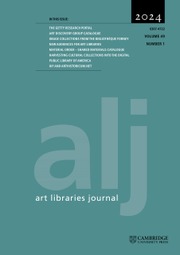Article contents
Fashion blogs: too trendy for libraries or useful resources?
Published online by Cambridge University Press: 06 June 2016
Abstract
Do your students look at blogs? Do you see them as information sources? Are they part of your library’s resources? This article summarises some recent research on fashion blogs, both ‘amateur’ and ‘professional’, and their use in providing information to fashion students. It highlights the potential usefulness of subject blogs, based on points that arose from the data collected from fashion librarians and students in interviews, an online survey and a round-table discussion. Hopefully the results will encourage you to consider your own stance on blog information in the library, whichever subject you support.
- Type
- Research Article
- Information
- Copyright
- Copyright © The Art Libraries Society 2011
References
- 3
- Cited by




